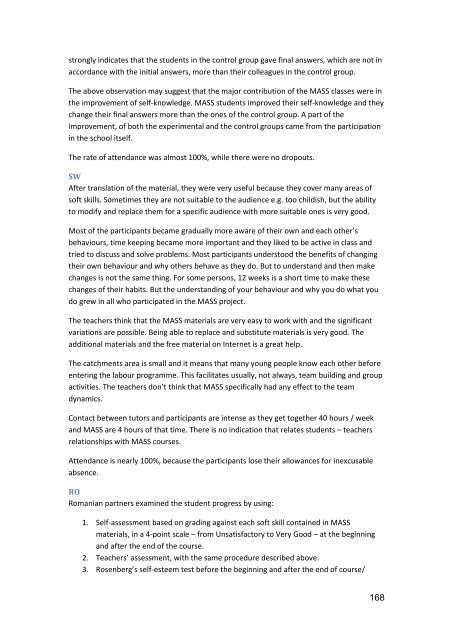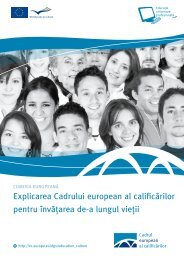Teaching and Assessing Soft Skills - MASS - Measuring and ...
Teaching and Assessing Soft Skills - MASS - Measuring and ...
Teaching and Assessing Soft Skills - MASS - Measuring and ...
You also want an ePaper? Increase the reach of your titles
YUMPU automatically turns print PDFs into web optimized ePapers that Google loves.
strongly indicates that the students in the control group gave final answers, which are not in<br />
accordance with the initial answers, more than their colleagues in the control group.<br />
The above observation may suggest that the major contribution of the <strong>MASS</strong> classes were in<br />
the improvement of self-knowledge. <strong>MASS</strong> students improved their self-knowledge <strong>and</strong> they<br />
change their final answers more than the ones of the control group. A part of the<br />
improvement, of both the experimental <strong>and</strong> the control groups came from the participation<br />
in the school itself.<br />
The rate of attendance was almost 100%, while there were no dropouts.<br />
SW<br />
After translation of the material, they were very useful because they cover many areas of<br />
soft skills. Sometimes they are not suitable to the audience e.g. too childish, but the ability<br />
to modify <strong>and</strong> replace them for a specific audience with more suitable ones is very good.<br />
Most of the participants became gradually more aware of their own <strong>and</strong> each other’s<br />
behaviours, time keeping became more important <strong>and</strong> they liked to be active in class <strong>and</strong><br />
tried to discuss <strong>and</strong> solve problems. Most participants understood the benefits of changing<br />
their own behaviour <strong>and</strong> why others behave as they do. But to underst<strong>and</strong> <strong>and</strong> then make<br />
changes is not the same thing. For some persons, 12 weeks is a short time to make these<br />
changes of their habits. But the underst<strong>and</strong>ing of your behaviour <strong>and</strong> why you do what you<br />
do grew in all who participated in the <strong>MASS</strong> project.<br />
The teachers think that the <strong>MASS</strong> materials are very easy to work with <strong>and</strong> the significant<br />
variations are possible. Being able to replace <strong>and</strong> substitute materials is very good. The<br />
additional materials <strong>and</strong> the free material on Internet is a great help.<br />
The catchments area is small <strong>and</strong> it means that many young people know each other before<br />
entering the labour programme. This facilitates usually, not always, team building <strong>and</strong> group<br />
activities. The teachers don’t think that <strong>MASS</strong> specifically had any effect to the team<br />
dynamics.<br />
Contact between tutors <strong>and</strong> participants are intense as they get together 40 hours / week<br />
<strong>and</strong> <strong>MASS</strong> are 4 hours of that time. There is no indication that relates students – teachers<br />
relationships with <strong>MASS</strong> courses.<br />
Attendance is nearly 100%, because the participants lose their allowances for inexcusable<br />
absence.<br />
RO<br />
Romanian partners examined the student progress by using:<br />
1. Self-assessment based on grading against each soft skill contained in <strong>MASS</strong><br />
materials, in a 4-point scale – from Unsatisfactory to Very Good – at the beginning<br />
<strong>and</strong> after the end of the course.<br />
2. Teachers’ assessment, with the same procedure described above.<br />
3. Rosenberg’s self-esteem test before the beginning <strong>and</strong> after the end of course/<br />
168





